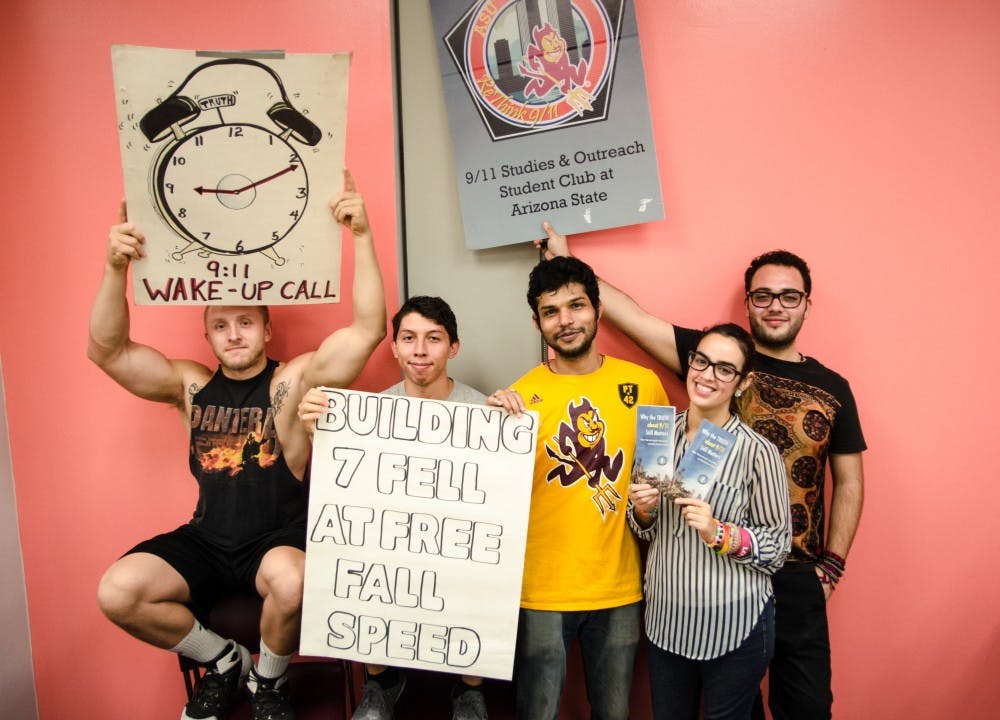For members of the 9/11 Studies and Outreach Club at ASU, the events on 9/11 were more than just terrorist attacks.
This organization of student "truthers," seeks to give students an alternate reasoning for the 9/11 attacks and to promote discourse among students about the lasting impact of the attacks.
"A lot of our friends and family don’t want to hear about conspiracy theories or alternative realities, so it's important to have a group where you can go and feel sane to talk about these important, deep issues," said Steve Cohn, a non-student Outreach and networking volunteer. "I just think that the events of 9/11 specifically were so historic and so impactful in that they changed the path of American history. They established surveillance states."
The club meets weekly and regularly engages in public demonstrations at events such as First Friday, a monthly art walk in Downtown Phoenix and the ASU homecoming parade. They also set up "truth booths" on campus regularly where they hand out pamphlets and speak to students.
During September of each year, club members hold a 9/11 memorial service.
Cohn said the club has about 40 registered members, and about 1,000 people signed up for their newsletter. They meet weekly in the Farmer Education Building.
Jill Robinson, a family and human development senior and the club's secondary officer, said club members vary in their personal versions of how the attacks transpired. She said students typically react adversely to their campaigns because they are stubborn.
"Some of our members think George W. Bush was totally behind it, some think he knew about it and didn't do anything," Robinson said. "We just don't think that people are ready to hear another opinion. They're just very set and OK with the official story."
Although members may differentiate, Cohn said most adhere to the theory promoted by Architects and Engineers for Truth.
Although the club is registered as a University organization — run by students — club officials said about half the club consists of non-students, such as Cohn, who helped found the club in 2013.
"A lot of the non-student members are assets, our friends, and we want them there," Robinson said.
Popular opinion suggests the theories the club is based on are conspiracy, but members have taken a stance vehemently against the term "conspiracy."
"The term 'conspiracy theory' does not indicate whether or not it is true or false, it's basically a term that is used to discredit an idea and is not always accurate," Cohn said. "Even the government version of the events is a conspiracy theory."
Raghwendra is the club's vice president and computer engineering graduate student. He said he got involved when he saw the club's booth at Passport.
"The thing is that people have been lied to about, and I don't want that to happen," Raghwendra said. "I want people to know what really happened so that these things don't keep happening to them. The more people know the less likely they are to be duped again and again."
He said the club usually attracts young people because older people who remember the 9/11 attacks well are not as willing to talk about the events.
On top of promoting alternate 9/11 theories, club members said they believe the club is helping them grow into better people.
Club members said they talk about alternate theories for other topics in their meetings as well, but they did not disclose which.
"The more we're out there talking about these issues we're learning as well," Cohn said. "We get to practice our public speaking skills, our organizational skills … for the ASU community I think it's important we are on campus because we bring an academic approach to the issue of 9/11 which has largely been considered taboo."
Reach the reporter at Garrison.Murphy@asu.edu or follow @Garrison_Murphy on Twitter.
Like The State Press on Facebook and follow @statepress on Twitter.




